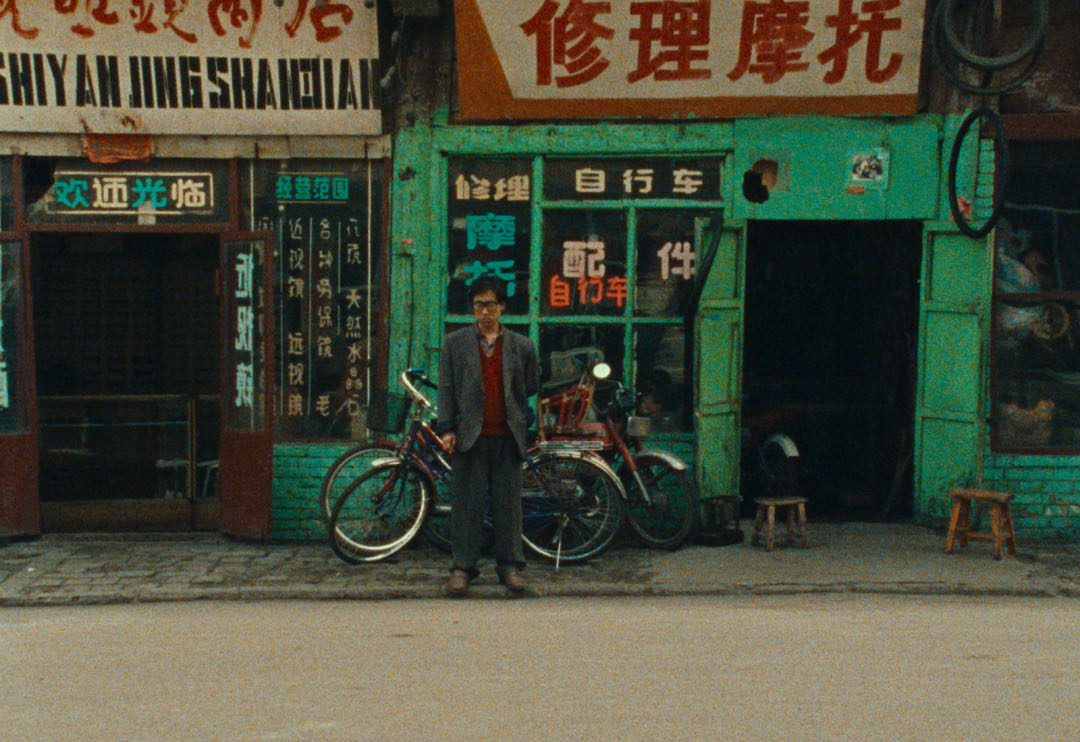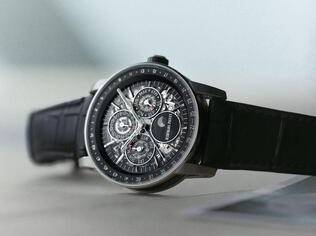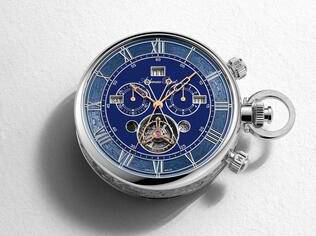The legendary filmmaker and Rolex Testimonee behind cinematic classics as GoodFellas, Raging Bull, Taxi-Driver and Casino, Martin Scorsese is not only one of the greatest director of his time, conquering audiences worldwide, he has also dedicated years of his life to preserving historic films, ensuring masterpieces of the past continue to entertain, enlighten and inspire.
Scorsese’s passion for preservation was first sparked in the late 1970s, when he attended a screening of the 1955 Billy Wilder classic, The Seven Year Itch, starring Marilyn Monroe. Although the print was the studio’s official archival copy and was only a couple of decades old, the colour had faded dramatically and the images grown foggy.

“Beyond the fact that the colour was lost, I realised that the performances were lost as well, and the characters along with them,” Scorsese recalled in a 2018 Encyclopædia Britannica essay. “The eyes of the actors had been reduced to smudged orbs of brown or blue, which meant that their emotional connections to each other and to the audience had been lost… This meant that the entire narrative was lost. In essence, the film itself was lost.”
Looking into the issue, Scorsese discovered that as a result of chemical decomposition, wear, fires and general neglect, roughly 80 percent of American silent movies and half of all Hollywood films made before 1950 had disappeared forever.
Bringing the problem into focus, Scorsese and friends such as Star Wars creator George Lucas and Jaws director Steven Spielberg would discuss the most memorable movies of their youth, only to find out, when attempting to hunt down a print, that none existed. These inspiring films had essentially been erased — and those that survived were swiftly deteriorating in quality.
“This seemed inconceivable to me,” Scorsese wrote. At the time, he noted, “On the one hand, there were countless celebrations of the greatness of Hollywood and the Golden Age of Movies. On the other hand, over half of it was gone, and that included several celebrated titles that had won multiple Oscars.” Scorsese decided that something had to be done.
In 1980, he wrote a letter to the attention of his friends, colleagues and fellow film lovers. It included the critical warning, “all of our agonising labour and creative effort is for nothing because our films are vanishing” as a wake-up call to his contemporaries in the industry. “We must act now,” Scorsese wrote. He began by leading a campaign to develop more stable colour film stock.
After a decade of lobbying for film preservation in a passionate but informal manner, Scorsese says Robert Rosen of UCLA’s School of Theatre, Film & Television suggested he get more organised in his efforts. Rosen encouraged Scorsese to create a foundation in partnership with other leading filmmakers to agitate for the cause and highlight the value of preserving cinema’s artistic legacy.
 (left) 1990 - The Film Foundation (TFF) is created by Martin Scorsese, along with Woody Allen, Robert Altman, Francis Ford Coppola, Clint Eastwood, Stanley Kubrick, George Lucas, Sydney Pollack, Robert Redford, and Steven Spielberg to address the urgent need for film preservation.
(left) 1990 - The Film Foundation (TFF) is created by Martin Scorsese, along with Woody Allen, Robert Altman, Francis Ford Coppola, Clint Eastwood, Stanley Kubrick, George Lucas, Sydney Pollack, Robert Redford, and Steven Spielberg to address the urgent need for film preservation.
(right) 1995 - The International Federation of Film Archives (FIAF) hosts Martin Scorsese, Clint Eastwood, George Lucas, and Steven Spielberg along with Peter Bogdanovich, Charles Burnett, and Nora Ephron at the Academy for a tribute to film preservation.
So it was that in 1990, the Film Foundation was formed by Scorsese along with seven other top directors: Woody Allen, Francis Ford Coppola, Stanley Kubrick, George Lucas, Sydney Pollack, Robert Redford and Steven Spielberg. Robert Altman and Clint Eastwood joined the effort a few years later.
 1991 - TFF funds its first restoration project. Five films from Republic Pictures: FORCE OF EVIL, THE PRIVATE AFFAIRS OF BEL AMI, PURSUED, RAMROD, and THE RED PONY (shown above), are restored by UCLA.
1991 - TFF funds its first restoration project. Five films from Republic Pictures: FORCE OF EVIL, THE PRIVATE AFFAIRS OF BEL AMI, PURSUED, RAMROD, and THE RED PONY (shown above), are restored by UCLA.
Working in partnership with archives institutions and studios, the foundation has helped to restore over 900 films, many of which would have been lost to history had the foundation not taken action.
In the years since the foundation’s establishment, “I think there actually has been a shift in consciousness and much more awareness of the need for preservation,” Scorsese said in the 2013 Jefferson Lecture in the Humanities for the National Endowment for the Humanities, adding “which is ongoing – because it isn’t something that’s done once. You have to keep going back, constantly, moving the films from one format to another, to make sure they survive, because it’s an endless process.”
 1998 - TFF funds the restoration of Frank Lloyd's LES MISERABLES at George Eastman House (GEH).
1998 - TFF funds the restoration of Frank Lloyd's LES MISERABLES at George Eastman House (GEH).
Since the mid-1990s, restoration has been predominantly executed digitally and today, most movies are viewed digitally, even in cinemas. Nevertheless, the foundation insists upon creating archival film prints of each project to guard against the chance of a digital file being lost or deleted. In Scorsese’s opinion, film remains the most reliable and durable means of preserving a movie.
 2004 - TFF funds the restoration of Jean Renoir's THE RIVER at the Academy.
2004 - TFF funds the restoration of Jean Renoir's THE RIVER at the Academy.
The foundation is not only committed to the conservation of American movies, but film from around the globe. Its World Cinema Project has restored 47 films from 27 different countries and the foundation has partnered with UNESCO and the Pan African Federation of Filmmakers (FEPACI) on a project to preserve 50 important African films.
The African Film Heritage Project, Scorsese says, will restore and distribute, “in Africa and around the world, a collection of the films from Africa that are historically, artistically and culturally significant.” Scorsese believes it is vital that viewers and filmmakers be exposed to different cultures through film. “Without Fellini or Kurosawa, you wouldn’t have Spielberg… or Terry Malick,” he says.
 2020 - The TIFF Cinematheque presents “From Noir to New Wave: A Tribute to The Film Foundation” in recognition of TFF’s 30th Anniversary. The restorations of IL BIDONE and XIAO WU (shown above) premiere at the Berlinale.
2020 - The TIFF Cinematheque presents “From Noir to New Wave: A Tribute to The Film Foundation” in recognition of TFF’s 30th Anniversary. The restorations of IL BIDONE and XIAO WU (shown above) premiere at the Berlinale.
The Film Foundation is committed to fostering the next generation of silver screen talent. Through its free educational platform, the foundation has to date, taught over 10 million children about film language and history through its curriculum, The Story of Movies.
Though cinema is a relatively new art form, Scorsese argues that the moving picture is as worthy of careful preservation as any classic oil painting, sculpture, work of literature or musical composition. So much has already been lost, he says, “We have to really take good care of what’s left — everything from the acknowledged masterworks of cinema, to industrial films, home movies, anthropological films, anything that could tell us who we are… who we’ve been, and who we’re becoming.”
With support from Rolex and his colleagues in the movie business, Scorsese and The Film Foundation are working to have the motion picture’s importance as a historical document recognised.
“We preserve because we can’t know where we’re going unless we know where we’ve been, can’t understand the future or the present until we have some sort of grappling with the past,” Scorsese says.

In addition to the work done with The Film Foundation, Scorsese also perpetuates the longevity of the craft by contributing to to the cultivation of new talent as a mentor under the Rolex Mentor and Protégé Arts Initiative, ensuring that the art of filmmaking continues on to future generations.



















